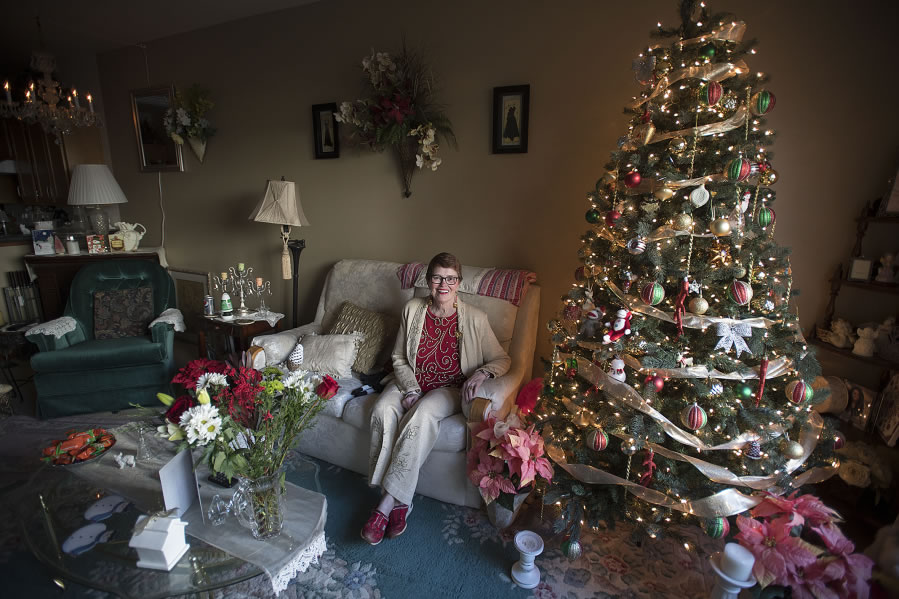Darla Blankenship has never valued the simple joy of taking it all in while strolling around the block with her son as much as she does this holiday season.
“We’re nosy people,” she laughed. “We like to walk around and see what’s going on.”
Blankenship, 73, suffered what appears to have been a “mini-stroke” in the early morning hours of Nov. 17. Her memory of exactly what happened that night is understandably fuzzy — but her recollection of the fear is clear.
“I don’t know what I thought,” she said, “I just know it was awful.”
Fortunately, a mini-stroke — the technical term is transient ischemic attack — is a blockage of blood to the brain that turns out to be temporary and clears up on its own. That’s what happened with Blankenship, who feels incredibly lucky to be back at home and feeling “99 percent normal,” she said.
But when the scary symptoms hit, Blankenship couldn’t know whether it was minor or major. Fortunately, she and her son did exactly what the American Stroke Association recommends: they didn’t hesitate to call for help and rush Blankenship to the hospital. If the mini-stroke had been worse, Blankenship could have died or been permanently disabled without fast treatment.
Unfortunately, the ASA emphasizes, the term mini-stroke can be misleading. “Warning stroke” is more accurate, since it may signal a bigger stroke to come. That hasn’t happened to Blankenship, who started a course of cholesterol-lowering and blood-thinning drugs and also has received treatment for her heart arrhythmia (Atrial Fibrillation). That’s a big risk factor for strokes.
Now, Blankenship wants everyone to know the symptoms of stroke and the recommendation of the ASA, which is easily remembered as FAST:
• Face drooping,
• Arm weakness,
• Speech difficulty,
• Time to call 911.
Frozen
At 2:45 a.m. Nov. 17, Blankenship woke up suddenly, with her arm frozen against her chest and her hand curled into a claw, she said. Her legs were curled up and frozen, too. She struggled to get out of bed and wound up sliding to the floor of her apartment at Vista Court, a Vancouver Housing Authority building in downtown Vancouver.
She cried out for her son, Brenden Naccarato, who was sleeping on the couch in the other room — and thank goodness he was there, both said during an interview one month later.
“She was trying to say she couldn’t move her arms or legs, but it was all gibberish and the side of her face was droopy,” Naccarato said. “She was trying to say call 911 and get an ambulance.”
The words were garbled, but the message was loud and clear. Naccarato made the call and the ambulance arrived quickly. Mother and son rode together to PeaceHealth Southwest Medical Center.
“It was 3 a.m. and they were going full bore with lights and sirens,” Naccarato said. “Fortunately, there was no traffic on the street at that hour.”
Blankenship’s luck stayed solid. She was in the emergency room and getting ready for brain scans when her abilities started to return, she said.
“I know while I was lying there I kept repeating names,” she said. “My brother’s first and last names, my son’s first and last names. I was trying to make my brain work.”
As the brain scans began, her legs and arms were already unfreezing on their own. So was her voice. She remembers a nurse breaking into applause, she said. No medication was ever administered, other than saline to keep her hydrated — but if the stroke had been more serious, medication to ease the cause (like a blood clot in the brain) would have been essential.
Usually, the American Stroke Association says, the window of time to administer medication after a stroke is three hours. That’s why the word is FAST.
Testing, shopping
Hours of mental testing began. “They show you pictures and sentences to see if you can comprehend,” Naccarato said. “She could say the words but she didn’t understand the pictures. I remember her looking at me with such a confused look.”
The confusion dissipated over the next few hours. Blankenship started passing those simple tests. The definition of a mini-stroke is one whose symptoms clear up on their own within a day.
“I knew she was pretty well back to normal when she was on her Macy’s app, shopping,” Naccarato said.
Mother and son stayed in the hospital that day and one more overnight. When she took a shower and dressed herself without any problem, the hospital staff decided it was time to send her home.
“They gave me a cane to walk with, but I don’t need it,” she said.
Just a few days later, mother and son enjoyed Thanksgiving together. “Talk about a thankful Thanksgiving,” Naccarato said.
Good day
The experience rattled her, Blankenship said, but now she’s basically fine. (When this lively, cheerful, talkative woman opened her door, this reporter assumed he’d found the wrong apartment.)
Still, she admitted, she does get a little depressed. “Maybe a little tired, a little confused sometimes,” her son added. They know that’s normal after a traumatic medical event, they said.
Blankenship isn’t one to dwell on bad news or talk about her troubles, they agreed, and she didn’t talk much about this experience until she called The Columbian to offer the whole story.
Finally spilling her guts about the whole thing was therapeutic, they both said.
“I just want people to know that life can be good after a stroke,” she said. “I know it’s common to not feel quite right, but I am grateful for every day. If I can get out of bed, it’s a good day.
“It’s going to be a wonderful Christmas season,” she said.




